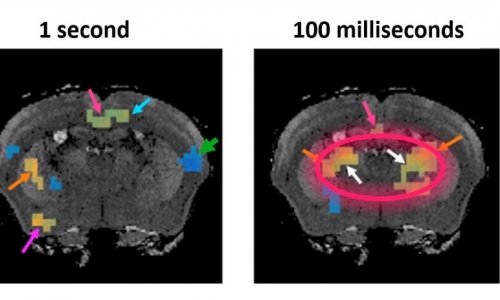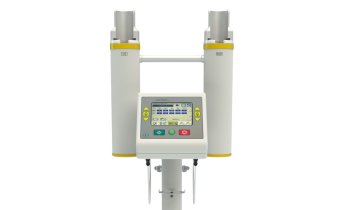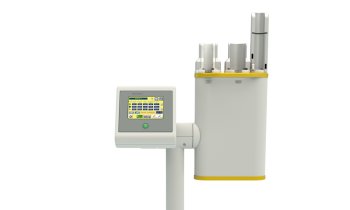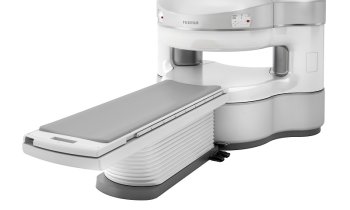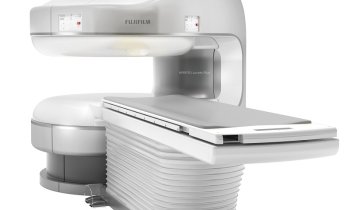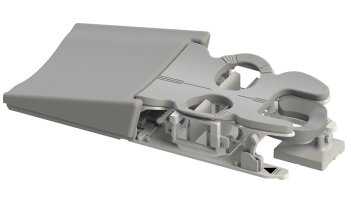Patient comfort
New MRI coils decrease scan time
New, screen-printed, flexible MRI coils may be able to reduce the amount of time it takes to get an MRI scan. Researchers funded by the National Institute of Biomedical Imaging and Bioengineering (NIBIB), part of the National Institutes of Health (NIH), have developed light and flexible MRI coils that produce high quality MRI images and in the future could lead to shorter MRI scan time periods.


MRI scans can reveal life-saving information about patients that other types of scans such as CT or PET cannot. However, the opening of the machine is small and can be uncomfortable even for patients who don’t suffer from claustrophobia. In addition, the machine makes loud noises for long periods of time during the scan as the images are being generated. But the chief difficulty is that MRI machines can take a long time, sometimes more than an hour, to produce the images needed by the doctor, and patients must stay perfectly still in the machine the entire time. These issues can make it difficult for many patients, but it is especially challenging with pediatric patients. To help immobilize infants, doctors will often use anesthesia, which is an added risk for this fragile patient population.
MRI scans take so long because they have a very low sensitivity. In some challenging pediatric cases where the patient is moving, the images may be degraded with artifacts—leading to useless data that can get in the way of a clear picture. The problem is that the main magnetic field has a big job to do. It needs to manipulate protons found in the water of the human body and it is difficult to affect enough of them simultaneously so the resulting picture is clear. One way to get clearer pictures would be to use a stronger magnet—and some new MRI machines do exactly this; but MRI machines are expensive –costing anywhere from $300,000 to a million dollars—which can strain a hospital’s budget.
Another way to increase the sensitivity of MRIs is to use high-density MRI coils arrays. These can be used to increase the strength of the received MRI signal as well as accelerate the acquisition of the signal, in order to get clearer and higher quality images. But, current receiver coils are often anatomically unmatched for the human body; they are heavy, inflexible, restrictive, and are uncomfortable for many patients.
To solve all these problems, Michael Lustig, Ph.D., and Ana Arias, Ph.D., both Associate Professors in the Department of Electrical Engineering and Computer Sciences at the University of California, Berkeley, and their team have developed new flexible MRI radiofrequency coils. The coils can be individually crafted with a screen-printer to fit patients of various sizes, such as infants or toddlers, or custom made for individual patients if needed. Screen-printing is the technology used for printing designs on T-shirts. Because these coils are light and flexible, they can be wrapped snugly around the patient’s body that increases the sensitivity of the exam and provides clearer pictures.
The coils are designed to work with the MRI machines that most hospitals already have (1.5 Tesla and 3 Tesla), and can be reused rather than having to be printed specifically for each patient. Arias, Lustig and their team developed a prototype of a blanket with the coils inside that can be wrapped around an infant. With printing technologies becoming more commonplace, this new design could, in the near future, be made practical for mass manufacturing and provide a low-cost way to help doctors get the information they need with the least amount of patient discomfort.. To achieve this, the team has joined forces with pediatric radiologist Shreyas Vasanawala at Lucile Packard Children’s Hospital, and GE healthcare to translate this technology to clinical practice.
“This technology could greatly increase patient comfort at a relatively low cost,” said Guoying Liu, Director of the program for Magnetic Resonance Imaging and Spectroscopy at NIBIB. “Not having to experience the trauma of long MRI exams is a significant benefit to pediatric patients and their parents during what is often a trying time. This new development is an excellent example of how new technologies can come together to create a better experience for the patient.”
Publication:
Corea, J. R. et al. Screen-printed flexible magnetic resonance imaging receive coils. Nat. Commun. 7:10839 doi: 10.1038/ncomms10839 (2016).
Source: National Institute of Biomedical Imaging and Bioengineering
07.06.2016




